INSIDE
RACING
T E C H N O L O G Y
Phoenix Start Page
Trucks Page 2
Trucks Page 3
IRT Home
News Page
Contents Page
Newsletter &
Books
email Paul
NASCAR Trucks at PIR
Uploaded 3/30/99, updated 5/7/99
Phoenix is the second race of the '99 season for the NASCAR Truck series. Mike Wallace won the season opener at Homestead. It's interesting that the Trucks started their season as a support race on a CART weekend and the next race they are support to the IRL. I know more people came to see the Trucks on Saturday at Homestead than on Sunday when the CART cars ran. I'll bet the same thing happened at Phoenix.
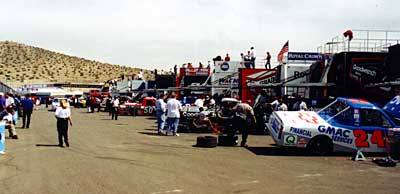
Looking East down the row of haulers as the teams prepare the racecars, pardon me, trucks for a practice session.
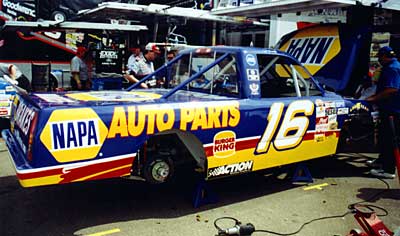
Ron Hornaday's truck up on jack stands with the crew at work.
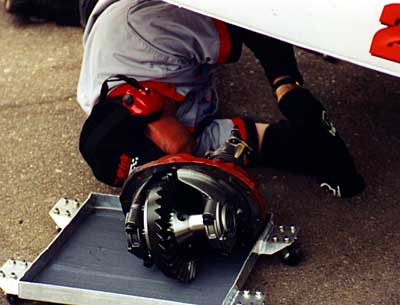
A crew member prepares to make a rear-end ratio change on the 24 car of Jack Sprague. You can see there are no spider gears as there would be if this were a road car. On ovals the trucks run a "spool" [wrong, see below] which connects the two axles solidly so both tires rotate at the same rpm. The spool is that shiny shaft to the right of the crown gear. The engines are very loud so everyone in the garage area wears ear protection.
Added 5/7/99: Chris Andrews, engineer for Gloy-Rahal Racing, called to chat and told me about a mistake I made. That's not a spool in the photograph above. Chris told me what I was seeing there is the housing of the Detroit Locker differential required at all races by NASCAR rules.
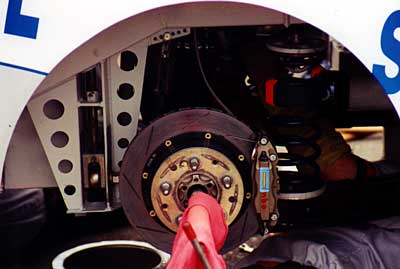
This is the right-rear suspension on the 24 car built by Hendrick Motorsports. I caught a lot of interesting stuff in this photo. The red rag is draped over the end of the axle shaft that has been pulled out a ways so the rear end ratio can be changed. A crown wheel as in the above photo will be installed and then the axles pushed back in to engage the splines.
On the left of the photo is the mount for the chassis end of the Panhard rod. It's adjustable vertically, you can see the screw threads. Look how well the mounting is braced. This is a trademark of all the Hendrick cars. They have tested the cars and braced anything that isn't supposed to move.
That's a Brembo brake caliper with a temperature-measuring device stuck on it. That yellow strip turns color depending on the maximum temperature it sees.
The coil spring is mounted on the trailing arm that goes forward to a mount off to the right. The rod at the top of the spring has a screw thread to adjust the ride height at this corner of the truck. Notice the black spring rubber held in by the red tape. They can jerk that rubber out during a practice session and lower the spring rate at this corner. That would put more weight on the right front and left rear moving the balance of the car toward push or away from oversteer.
Those holes above the brake rotor going up to the right are mountings for the chain that limits the rear suspension droop movement and prevents the springs from falling out of the mounts. The teams also use this chain to get the rear axle off the ground with the minimum pumps of a jack so pit stops can be done quicker.
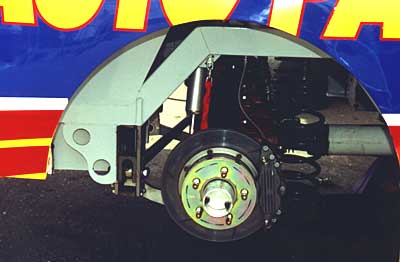
The right-rear suspension of Hornaday's car. This is a view similar to the photo above but just a little more forward so you can see the Panhard rod going from the adjustable mount off to the left side of the car. Whoever built this chassis doesn't use as much gussetting as on Hendrick cars. A shock absorber is visible also as is the droop chain. Below the Panhard bar mount is the arm going to the anti-roll bar.
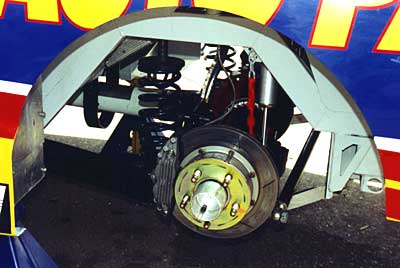
The other side of the same truck. That black rod coming from the other side to the right of the brake rotor is the Panhard rod which locates the rear axle longitudinally and takes all the lateral loads from the rear tires to the chassis. The adjustable height on the other end varies how those forces affect the rear tires and is a balance adjustment.
The shiny link going up to the right below the Panhard rod is the left-hand lever for the anti-roll bar. Notice the very substantial U-strap that prevents the driveshaft from falling down if a U-joint breaks.
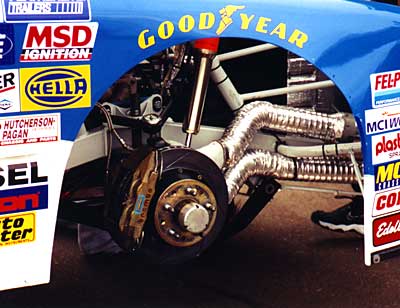
The front right suspension on the 24 car. You can see a relatively short upper A-arm with a ball joint outboard. These cars have geometry that creates camber gain as the car rolls. The tires are small for the weight and they need to take care of them. The link in front of the brake caliper goes to the front anti-roll bar. The shock is built by Hendrick using Penske Racing Shocks components. Pretty tidy brake ducting.